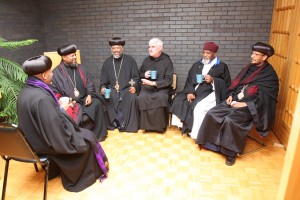The Collegeville Institute’s approach to ecumenism is, like Christianity itself, profoundly incarnational. Beyond research conducted and books written, the Collegeville Institute’s impact on the world can best be measured in terms of people and relationships. Unlikely networks of Christian friendships have far-reaching consequences for the places and organizations to which people return after their stay at the Collegeville Institute.
Through its people the Collegeville Institute has always been anchored in myriad forms of official ecumenical exchange and encounter. The “Collegeville approach” has imprinted itself on the highest-levels of international dialogues, such as those between the Vatican and Pentecostals, Methodists, Lutherans, or Disciples of Christ; or those between Lutherans and Orthodox, and many others. Indeed, there is virtually no cross-denominational conversation to which Institute people have not contributed locally, nationally or internationally.
 The Collegeville Institute is also a safe, steady place where “bridge builders” are formed, people who bring new and passionate visions of ecumenism and church to the table, including Orthodox laity, African American biblical scholars, Christians living in non-Christian cultures, and men and women who have found hope and renewal outside the church. A series of consultations between Pentecostal, Holiness, and Evangelical Christians in the mid-1980s helped bring these traditions into fellowship with each other and with other churches worldwide.
The Collegeville Institute is also a safe, steady place where “bridge builders” are formed, people who bring new and passionate visions of ecumenism and church to the table, including Orthodox laity, African American biblical scholars, Christians living in non-Christian cultures, and men and women who have found hope and renewal outside the church. A series of consultations between Pentecostal, Holiness, and Evangelical Christians in the mid-1980s helped bring these traditions into fellowship with each other and with other churches worldwide.
Much of the world of ecumenical dialogue is a movable feast of conferences and events. In contrast, the Collegeville Institute for Ecumenical and Cultural Research is a permanent place where ecumenism is constantly lived as well as learned. Scholars and their families reside together at the Collegeville Institute. This enables the formation of community and friendship essential to profound ecumenical awakening and exchange. The Collegeville Institute’s connection to Saint John’s Abbey and University imparts a peaceful, prayerful, and hospitable perspective to scholarship and the ecumenical enterprise. Nourished by the Benedictine spirituality of the long haul, the Institute is content to have a wide, slow, fermenting influence in the world and in the church.


